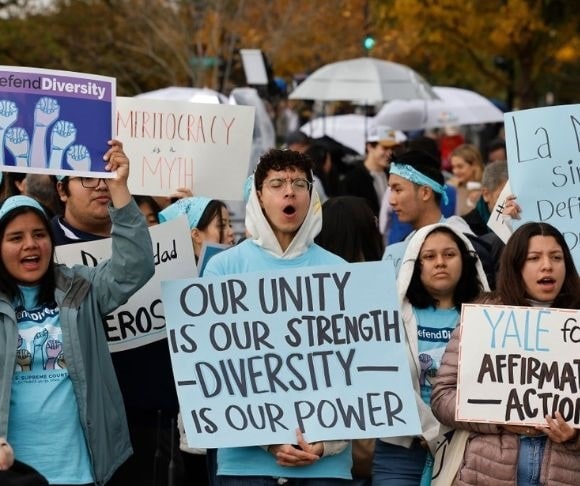The most significant change in higher education in two generations may be upon us as early as Thursday, June 8. The US Supreme Court is set to rule on a new nationwide law regarding affirmative action, or diversity, equity, and inclusion (DEI). Court watchers expect a landmark judgment in two cases that would reverse current law, which allows race-based discrimination in higher education. The cases are Students for Fair Admissions v. Harvard and Students for Fair Admissions v. North Carolina, covering private and government-run schools, respectively.
All Educations Matter
The history of access to higher education includes discrimination against blacks and other minority groups in instances too numerous to count. These practices were banned in 1964 for public colleges and by 1970 for private schools. Discrimination against whites and Asians, however, is legal and proceeds apace, growing ever since the Supreme Court said it was okay in 1978. No legislation passed through Congress; it was simply judge-made law. So, no new law needs to pass to change the rules again, just a majority of Supreme Court Justices – one that looks present on today’s Court.
The Supreme Court first allowed race to be used in admissions during the University of California v. Bakke (1978) case. Then, in Grutter v. Bollinger (2003) and Gratz v. Bollinger (2003), the Justices upheld Bakke but with some limitations. In The New Criterion magazine, Gail Heriot, a professor at the University of San Diego School of Law, wrote that the Court’s rulings “essentially issued colleges and universities a free pass: they can discriminate against Asians and whites in admission as much as they want, so long as they don’t make it embarrassingly obvious by allocating a specific number of seats in the class to applicants from favored races (as in Bakke) or awarding those applicants a specific number of extra admissions points (as in Gratz).”
Fisher v. University of Texas in 2016 was the last big Supreme Court case on affirmative action. Justice Elena Kagan had to recuse herself, though, and Justice Antonin Scalia died after oral arguments but before the Court ruled. The resulting 4-3 decision allowed racial discrimination to continue. Justice Clarence Thomas’ dissent stated plainly, “a State’s use of race in higher education admissions decisions is categorically prohibited by the Equal Protection Clause.” Quoting a previous opinion, he wrote that the Constitution “does not change in the face of a ‘faddish theor[y]’ that racial discrimination may produce ‘educational benefits.’” It seems his vote on the issue is firm.
Affirmative Action in Practice

(Photo by Chip Somodevilla/Getty Images)
Heriot is not just a law professor; she sits on the US Commission on Civil Rights, an independent federal commission created by the Civil Rights Act of 1957. Before her appointment, she was a professor at George Mason University’s School of Law, now called Antonin Scalia Law School. She recently detailed how accreditors drove discriminatory standards at the institution because they were unsatisfied with the small proportion of entering minority students.
The story is the epitome of the affirmative action tragedy. The American Bar Association (ABA) accreditors refused to renew Mason’s bona fides because it lacked a “significant preferential affirmative action program.” School administrators operated numerous outreach efforts to increase minority enrollment, without success. So, Mason lowered admission standards for black and brown candidates to keep its accreditation. But that wasn’t good enough, so it dropped standards again to save and renew its creds.
Helping or Hurting?
 President Ronald Reagan said, “The nine most terrifying words in the English language are ‘I’m from the government, and I’m here to help.’” Affirmative action was supposed to help blacks accelerate achievements and make up for previous wrongs. Instead, it has produced failed students with discounted degrees that the market knows come with an asterisk – unearned achievement. Heriot wrote that 45% of the black students admitted to Mason’s law school during the period of Bar Association pressure “experienced academic failure” while only 4% of students from other races did. So whom is affirmative action helping? She quoted a letter from the Mason dean to the ABA: “We have an obligation to refrain from victimizing applicants, regardless of race or color, by admitting them to an educational program in which they appear likely to fail.” The biggest beneficiary of ending affirmative action will be blacks because they are the primary victims of the program.
President Ronald Reagan said, “The nine most terrifying words in the English language are ‘I’m from the government, and I’m here to help.’” Affirmative action was supposed to help blacks accelerate achievements and make up for previous wrongs. Instead, it has produced failed students with discounted degrees that the market knows come with an asterisk – unearned achievement. Heriot wrote that 45% of the black students admitted to Mason’s law school during the period of Bar Association pressure “experienced academic failure” while only 4% of students from other races did. So whom is affirmative action helping? She quoted a letter from the Mason dean to the ABA: “We have an obligation to refrain from victimizing applicants, regardless of race or color, by admitting them to an educational program in which they appear likely to fail.” The biggest beneficiary of ending affirmative action will be blacks because they are the primary victims of the program.
Upon his graduation from Yale, our country’s most prestigious law school, Clarence Thomas looked forward to numerous offers of lucrative and exciting employment opportunities. Instead, he was given scant attention and had to settle for lesser options. Why? Not racism. Thomas blamed affirmative action. He may lead the Court to do something about it very soon. The cases were argued on Oct. 31, 2022, and now rulings are expected sometime in June. The class of 2027 could be the first in the United States without legal racial discrimination.




